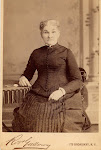 The General Registry Office recently sent me the marriage certificate for my 2nd Great-Grandparents, Stephen Walch and Elizabeth Charnock. They were married on the 23rd of November 1846 in The Church of Our Lady & St. Nicholas With St. Anne in England. That would be a fitting name for the Church of the Indecisive, but it is instead the sailors’ church at the main port of Liverpool. It was extensively damaged by bombs in World War II but has been reconstructed to look much like the church in which our ancestors were united.
The General Registry Office recently sent me the marriage certificate for my 2nd Great-Grandparents, Stephen Walch and Elizabeth Charnock. They were married on the 23rd of November 1846 in The Church of Our Lady & St. Nicholas With St. Anne in England. That would be a fitting name for the Church of the Indecisive, but it is instead the sailors’ church at the main port of Liverpool. It was extensively damaged by bombs in World War II but has been reconstructed to look much like the church in which our ancestors were united.The marriage certificate was important for several reasons. Not only is it the gold standard “proof” that genealogist seek, but more importantly we discover for the first time the names of the couple’s fathers: James Charnock and Peter Walch, (although on the certificate it was spelled ‘Walsh’). Another important proof is Elizabeth’s use of the surname Laithwaite and her designation as a widow. Further research shows that Elizabeth was previously married three years before to John Laithwaite, a young coal miner.
One of the more interesting fields of information on the certificate is Occupation. James Charnock was an “Engineer,” which later research would clarify him to be an Engine Tender at a colliery. I am not positive what this occupation entailed but it was part of a coal mine operation, most likely operating steam engine elevator lifts and the like.
The occupations for Stephen and Peter Walch were the same – “Stone Getters.” I know that Stephen worked as a stone cutter for most of his life, but the word “getter” was puzzling. It became clearer after I read George Orwell’s The Road to Wigan Pier (1937). This is a free Google book which can be read in its entirety online. I perused it to familiarize myself with Wigan, a town in Lancashire County, England, west of Liverpool. It was the town in which Elizabeth Charnock was first married, and therefore the likely parish of her parents. I wanted to get a sense for the daily life in the area. But the book written almost 90 years later, portrayed the average life in Wigan as one of subsistence living in an environmentally polluted town. Due to the popularity of the book, Wigan became a national symbol in England for the over industrialized town.
Orwell also wrote extensively about the work of miners, and at one point describes the literal cutting edge of the operation. In a dark and dust filled opening and with ceilings of only three to four feet high, miners knelt side by side ramming their shovels in the coal face then tossing the coal over their shoulders. In a hot mine they worked nude except for knee pads and they worked continuously for seven hours with only a brief 15 minute lunch break, which they ate where they paused. This was the most laborious and dangerous work of the coal operation. These men, covered in coal dust and sweat, were called the “getters.”
I later learned that “getters” in a quarry served in the same capacity. They were the men who loosened stones at the quarry face with chisels and dynamite. Their work too was the most laborious and dangerous and, thus, like the miners, the highest paid.
The word getters in this context made me think of Daniel Quinn’s “takers.” In his book Ishmael (1992) Quinn divides humankind into the Takers and Leavers. Takers believe "the world was made for man, and man was made to rule it. In this context, the gods gave man two choices: a brief but glorious life or an uneventful life in obscurity. I would guess that we are all takers at some level of our existence, but I like to think that takers refers primarily to the capital-T Takers, or the truly wealthy whose greater existence depends on the number getters under their control.
Most of our ancestors have been getters in one form or another: farmers, lumberjacks, fishermen, quarrymen, and factory assembly men. Even social workers are getters, according to my old economics professor. He called us the ambulance drivers and the stretcher barriers of the capitalist system.
And what is Quinn's prescription for a sustainable world in the new millennium: "The story of Genesis must be undone.” The world was not made for humankind. You are not the endpoint of evolution. “This is essential if you're to survive. The Leavers [cultures more in harmony with nature] are the endangered species most critical to the world- not because they're humans but because they alone can show the destroyers of the world that there is more than one right way to live. And then, of course, you must spit out the fruit of the forbidden tree. You must absolutely and forever relinquish the idea that you know who should live and who should die on this planet."





2 comments:
Hello I live on Cinnamon Brow; this link
http://www.aboutmyplace.co.uk/showmap?id=950613&type=postcode&search_location=wn8%200nf
should show you what it looks like now! 'Birds-Eye' view is good!
This is one of the best finds I've had! Thank you very much! Alfred Drew as my grandfather's grandfather..so he is several greats down the road of me! The Drew name survives...I'm Nathan Drew Allen, and my oldest son is Jacob Drew Allen...love this site, thanks for keeping it up, John!
Post a Comment